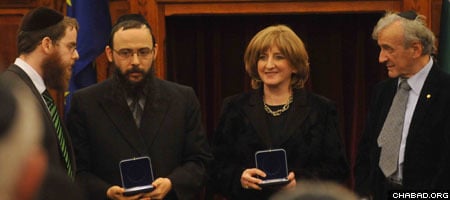Near the end of an historic two-day return to his native Hungary, Holocaust survivor and Nobel Peace Prize laureate Elie Wiesel lit a candle at the Budapest Holocaust Memorial and embraced the brother of two individuals mentioned in Night, his semi-autobiographical memoir of life in the concentration camps.
According to Rabbi Shlomo Koves, the leader of the EMIH Jewish Community and the director of the Open University for Judaic Studies in Budapest who arranged Wiesel’s visit as part of a celebration of 20 years of Chabad-Lubavitch activities in the country, the public was struck by the poignancy of a trip that Wiesel – then a liberated post-World War II refugee – said he would never make.
Wiesel was also quite moved.
“The entire visit was very emotional for him,” said Koves, who also serves as associate rabbi of Lubavitch of Hungary, “very personal.”
Addressing more than 600 government officials, foreign dignitaries and religious representatives at the Hungarian Parliament last week, Wiesel did not mince words when referring to the country’s involvement in the Holocaust and the need to fight racism and anti-Semitism today.
“The opposite of love is not hate, but indifference,” stated Wiesel, who participated in a special legislative conference titled “Jewish-Hungarian Solidarity for a Shared Future.” “The people I belong to suffered because too many bystanders remained silent.”
But he also praised the Hungarian people for their commitment to rebuild a “system of values” after defeating Communism, and urged them to “be strong in the resolve to implement [their] ideals.”
Turning to the Jewish community, which has rebounded in the last two decades, Wiesel spoke of the significance of the event and thanked “friends of the Hungarian Jewish community, rabbis and members of Chabad for continuing a history of learning, [and] of medical and scientific discoveries. … Your presence here among these lawmakers means a great deal to me personally.”

Memory Into Action
Prime Minister Gordon Bajnai also addressed the conference, which was organized by the Hungarian Parliament’s Committee on Human Rights, Minorities and Religious Affairs, the Unified Hungarian Israelite Community and the Federation of Hungarian Jewish Communities. Bajnai saw in the Jewish community’s strength a message for all of his country’s citizens.
“We have a lot of reasons to be happy today, to celebrate, because the Hungarian Jewish Community is once again vital and reviving,” said the prime minister. “This makes the whole country stronger.”
He praised the work of Rabbi Baruch and Batsheva Oberlander, the children of Hungarian Holocaust survivors who moved to Hungary in 1989 to establish the country’s first Chabad House. Bajnai said the couple played an “especially vital role” in the growth of Jewish religious and cultural life in Hungary.
For his part, Oberlander drew a lesson from pre-Holocaust history.
“In the past, there were Jews who assumed that if they would stop being different, they wouldn’t be hated,” he told the conference. “The Holocaust shows that conformity solves nothing. It made things worse. You must know that you are Hungarian, but you are also a Jew.”
The remarks echoed a point made earlier by Wiesel, when he urged members of the Jewish community “whatever you do, wherever life may lead you, stay Jewish. … Do not allow others to determine the quality of our faith.”
Oberlander referred to a letter the Rebbe, Rabbi Menachem M. Schneerson, of righteous memory, once wrote Wiesel in which he urged him to “put memory into action, [and] be a living example of the beauty of Jewish tradition.”
The morning after the conference, Wiesel met with Hungarian President László Sólyom to discuss proposed legislation that would outlaw hate speech and Holocaust denial, as well as the need to strengthen Holocaust education in public schools and open Holocaust-era archives.
Later in the day, he had a private luncheon with 25 Hungarian Holocaust survivors. Among the group were a few men who had been in Auschwitz with Wiesel. Afterwards, they all participated in a ceremony at the Holocaust memorial.
In newspapers and other media outlets across the country, the visit was still garnering headlines days after Wiesel returned to the United States.
Koves noted that government officials, including the Minister of Defense, actively participated in Chanukah menorah lighting ceremonies the week after the conference, and that Bajnai wrote of “unity and tolerance” in his holiday letter to the Jewish community.
“The Jewish answer to oppression is that we increase in light,” said Koves. “Wiesel accomplished this by coming here, and that is what the Jewish community is doing now with the celebration of Chanukah.”








Start a Discussion